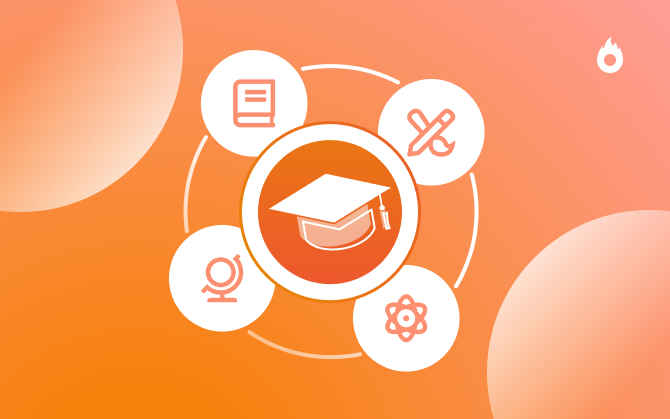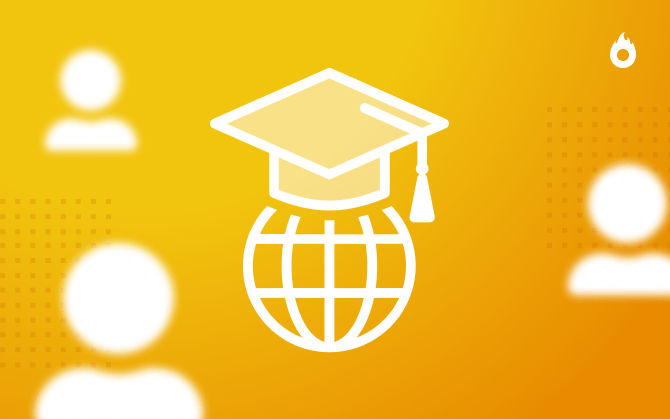
What is education, anyway? Check out its full definition and concepts
See how education has changed in the digital age and everything about DE.

What will we see in this post
Have you ever wondered “What is Education”? In this article, we present the best definitions!
In many places, education is divided into levels and modalities. In the USA a few examples of levels are preschool, primary school, secondary school and university. Bear in mind that each country has its own education system and there are many variations.
Modalities, on the other hand, may be:
- School education
- Professional and technological education
- Education for youth and adults
- Distance education
- Among others.
The school education modality, which comprises the traditional type we’re familiar with (basic and college education), hasn’t undergone many changes over time.
However, digital transformation has been creating significant changes throughout education. In this post, you’ll learn about the impacts of these changes and their benefits for teachers and students.
Let’s get started?
What is Education – the concept!
Education is a teaching and learning system aiming to socialize individuals and maximize their development.
Though it may be commonly linked to knowledge, these two terms should not be confused. Education is related to moral rules, while knowledge is broader than that.
Despite being linked to moral rules, it doesn’t represent them in itself. Therefore, education is considered an extensive system, with different methods, procedures and tools.
Teaching in education is a key point of this variety, check it out below!
Teaching methods
As you’ve seen, there are many teaching methods within education.
Let’s learn a bit more about the most common ones!
- School education: Is our society’s traditional education, in which all individuals have to attend during their childhood and teenage years. It is divided into levels: basic and college.
- Special education: A modality aimed at people with disabilities or mental illness.
- Professional and technological education: Focused on workforce training. It allows students to develop technical knowledge in a given professional and skills to help them in the job market.
- Education for Youth and Adults: Aimed at those who did not complete their basic schooling at the appropriate age. This modality should be offered free of charge by the educational systems.
- Distance education: A modality that became popular with the emergence of the digital age and has been growing a lot since then. As the name says, this teaching modality takes place online with the help of the internet, normally by means of DE platforms.
Education in the digital age
Advances in technology, the rise of the digital age and the internet have affected many areas, including education.
In this area, we can observe an increasing use of technology in classrooms and a complete disruption of the classical teaching models.
Institutions are increasingly taking advantage of the convenience and benefits of features, such as the internet, electronic equipment, gamification and online platforms in order to enhance teaching.
In cases where these two models are used, we have what is called hybrid teaching.
Hybrid teaching keeps up to date with technological advances, attracting students’ attention and cutting costs, while maintaining onsite teaching characteristics.
On the other hand, many institutions are beginning to integrate online education fully and providing entire courses online, especially when it comes to higher education.
In addition, another growing area within distance education is informal courses. Because they offer training outside the academic sphere, these courses are not included in the concept of education, but present a major opportunity for those who wish to teach and learn.
They also represent an important and growing contribution to society. You’ll learn more about these opportunities below!
What is distance education or DE?
In order to stress the explanation of the previous topic, when dealing with onsite courses, we can find higher education courses (i.e., an education model) and informal courses, which are not an educational model, but are part of distance education or DE.
In short, distance education (DE) is an educational modality based on classes that take place partially or totally in a virtual environment.
In other words, teachers and students don’t need to meet in person in order to convey content. The classes can be streamed on specialized platforms through video classes and complementary content.
In order to make distance education effective, the platform on which the courses are hosted should offer a good virtual learning environment (VLE), be customizable, allow communication and support various content formats.
So far, so good?
Now, keep reading and check out the main DE forms, characteristics and terms.
Online higher education
Distance learning in higher education has been growing steadily over the past years and it’s expected to keep on growing.
Although it’s gaining a lot of popularity and attracting many people — especially those who don’t have the time or wish to spend less in order to obtain a degree —, online college courses aren’t applicable to any college course.
Medical school, for example, has not been approved to be fully provided online in most countries.
Despite this, online college courses present a major step forward and can be worthwhile in many cases. For example, in order for institutions to have more students and for students who don’t have any other option to obtain a college degree.
Informal courses
Informal courses are online courses on any subject that convey knowledge on the internet.
They are usually provided by DE platforms that have the support to broadcast the virtual lessons, complementary materials and have interactive environments.
They are sought after by those who wish to complement their basic education, gain extra knowledge or develop themselves personally.
As with online college courses, informal courses have also been presenting a huge growth recently. After all, they present numerous advantages, which are:
- Wide range of course subjects with clear, specific and practical objectives
- Easily accessible
- Low cost in comparison with onsite courses
- Allow autonomy and flexibility for students and teachers
- Many offer certificates that can be included in one’s resume.
Not to mention what these courses represent for the economy, since many people with a specific talent or knowledge find it easier to turn this into work, creating their own online course, whether this is your main job or something to supplement your income.
DE teacher
A DE teacher’s role is similar to teachers in traditional teaching. Teachers must plan their classes, record the course, know how to convey the content well, instruct, motivate their students and develop activities.
The difference is that in an online class, the content will be conveyed to a larger number of students anywhere in the world.
In addition, online teaching presents advantages for teachers that don’t exist in onsite teaching, such as:
- Being able to work from anywhere, even from home.
- Having the constant support of several digital technologies in enhancing the classes.
- Being able to teach what you love.
- Being able to scale the course.
And there’s more. With the popularity of informal courses and the ease of having your own business nowadays, anyone who wishes to share knowledge can become an online teacher.
DE tutor
In distance education, a new role emerges, the tutor. A DE tutor works with the teacher providing support to students, contacting them, answering questions, correcting examinations, etc.
Tutors exist due to the complexity of online classes, since these classes can have a huge proportion.
As we’ve explained earlier, online courses can be provided to a much larger number of people, and teachers usually cannot meet all of students’ demands.
To solve this problem, the tutor’s help is important in order to maintain the good quality of the online classes.
Studying online
One of the great concerns of those who are still new to the world of distance education is whether this model really works, especially those who wish to study online, but don’t know if they’ll do well while studying online.
Well, as we mentioned at the beginning of this article, DE isn’t for everyone. But, those who really need it or are motivated to make it work can obtain good results.
Since there are tips that make DE students’ life easier. Below are a few of them:
- Planning: Having a clear goal, organizing tasks, and establishing goals and rules.
- Time management: Setting aside time for studying and for course activities.
- Prioritizing: Making choices that will be best for you and for your studies at each moment.
- Setting aside a space for studying: Having your own quiet place, a desk, chair and the proper equipment.
- Knowing your limits: Not overdoing it and knowing how to balance activities.
- Avoiding distractions: Focus only on the class, and leaving your cell phone and other things for later.
- Taking breaks: Remembering to take breaks to rest and eat.
- Not procrastinating: Doing your exercises at the proper time.
- Asking questions and developing your knowledge: Don’t be ashamed to ask questions, contact your teacher and tutor, and find other additional content.
Moreover, DE has one great positive point for students: its prominence.
Unlike the traditional model, online courses have a totalitarian view that the classroom is broken, and students are those truly involved in the learning process. This values autonomy and is certainly more motivating for those who are learning.
Is distance education worth it?
After getting a better understanding of what is education and how it has been revitalized with distance education, you have probably reached a few conclusions, right?
But this was merely an overview of distance education. If you’re interested and wish to know more, read our full content on distance education.





